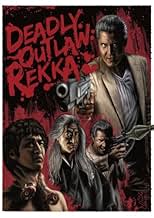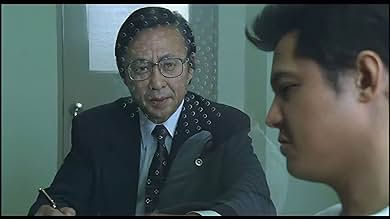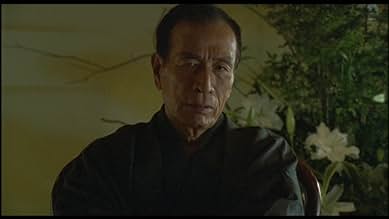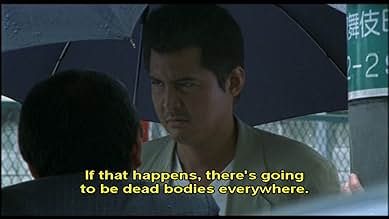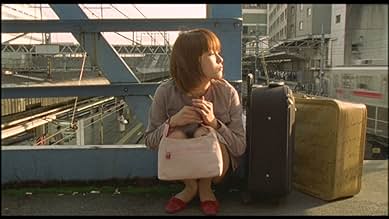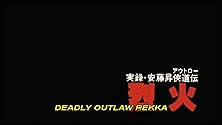IMDb RATING
6.7/10
1.8K
YOUR RATING
When his beloved boss is killed, a dangerous young gangster cuts a path of vengeance through the Japanese mafia.When his beloved boss is killed, a dangerous young gangster cuts a path of vengeance through the Japanese mafia.When his beloved boss is killed, a dangerous young gangster cuts a path of vengeance through the Japanese mafia.
- Director
- Writer
- All cast & crew
- Production, box office & more at IMDbPro
6.71.7K
1
2
3
4
5
6
7
8
9
10
Featured reviews
Takashi Miike is my hero!
Miike makes another yakuza picture. It's not especially groundbreaking, and it's certainly not one of Miike's deeper films, but it is extremely entertaining. That's mostly because of the main character, Kunisada (Miike regular Riki Takeuchi), who is the most psychopathic character in Japanese movies since Tatsuya Nakadai's evil samurai in Sword of Doom. Kunisada's mob boss, his surrogate father, is ambushed and murdered (though not before nearly strangling his assailant to death; the hit-man only lives because he cuts the dead man's hands off as they clench around his windpipe). Simultaneously, Kunisada, almost as if through a psychic bond, breaks out of jail and starts to go against the rival gang. The only problem is that the boss's death isn't necessarily a bad thing from his own gang's perspective. They and their rival gang try desperately to make a truce. Unfortunately for everyone, except for a small handful of loyal comrades, Kunisada won't stop until everyone around him is dead. The film suffers from Miike's major flaw as a filmmaker: a lack of coherency. There seem to be dozens of named characters, and it becomes very difficult to sort out who everyone is. I had to watch key scenes a second time to piece it all together (though I had most of it straight by the end of the film). But, even if you never quite figure it out, Miike's patented break-neck action sequences are so outrageously done that the film is more than worth watching. Watch out when Kunisada finds a rocket launcher!
unabashed fun
excerpt, more at my location - A yakuza film is bread and butter for Takashi Miike, and Deadly Outlaw: Rekka (Jitsuroku Andô Noboru kyôdô-den: Rekka), sandwiched between the sadistic violence of Ichi The Killer and the surrealism of Gozu, is surprisingly ordinary when compared with much of the director's oeuvre. However, the straightforward nature of this 2002 film is the essence of its charm.
Deadly Outlaw: Rekka is such unabashed fun it will leave you feeling indulgent and sporting a maniacal grin from start to finish, just like the one, you might imagine subsequent to viewing, Miike wore while making it. Concentrated to an hour-and-a-half, as so few recent films are, it hits you like a shot of pure audio-visual entertainment straight in the arm.
Deadly Outlaw: Rekka is such unabashed fun it will leave you feeling indulgent and sporting a maniacal grin from start to finish, just like the one, you might imagine subsequent to viewing, Miike wore while making it. Concentrated to an hour-and-a-half, as so few recent films are, it hits you like a shot of pure audio-visual entertainment straight in the arm.
Rock and Roll non stop!
Miike shows us in this film his outstanding gift for the yakuza genre from the first minute to the last. This time he adds a soundtrack from the Flower Traveling Band, Satori, a Doom Metal key album from 1971 that makes those master shoots, of perfect color, shine without stopping during the cinematographic experience he proposes.
His characters flow before the viewer like a handful of impossible to stop Japanese scarfaces. Shinjuku, mafia, escorts, magic and Rock and Roll !!
The highlights make it well worth your time
Assassins from the Otaki group murder Yuya Uchida (manager/producer of 1970's psychedelic prog metal band Flower Travellin' Band, who provide the film's soundtrack) leader of the Sanada group. Riki Takeuchi considered him a father figure and wants vengeance, but the leaders of both groups want to avoid a war and enlist Bando group leader Sonny Chiba to negotiate a truce.
So ... it's all a scheme by both groups second-in-commands to eliminate the leaders and take over, with Chiba running the whole show. They trick Takeuchi into killing Otaki group leader Renji Ishibashi and then try to kill him to close all loose ends. Those loose ends stay very much open.
Takashi Miike has a tendency to make films that are so loose and ramshackle that they feel like they may fall apart at any minute. This is one of those. That doesn't mean they're necessarily bad ... and this one certainly isn't ... but it does mean that after a really dynamic opening and before it's amazing gonzo conclusion, you get a lot of meandering scenes of yakuza dumping plot exposition on each other. It's not always dull ... mainly due to Miike's tendency to stage very weird scenes like two yakuza talking outdoors in a playground in the rain each holding tiny transparent plastic umbrellas ... but it frequently is.
The Flower Travellin' Band soundtrack is worth the price of admission.
So ... it's all a scheme by both groups second-in-commands to eliminate the leaders and take over, with Chiba running the whole show. They trick Takeuchi into killing Otaki group leader Renji Ishibashi and then try to kill him to close all loose ends. Those loose ends stay very much open.
Takashi Miike has a tendency to make films that are so loose and ramshackle that they feel like they may fall apart at any minute. This is one of those. That doesn't mean they're necessarily bad ... and this one certainly isn't ... but it does mean that after a really dynamic opening and before it's amazing gonzo conclusion, you get a lot of meandering scenes of yakuza dumping plot exposition on each other. It's not always dull ... mainly due to Miike's tendency to stage very weird scenes like two yakuza talking outdoors in a playground in the rain each holding tiny transparent plastic umbrellas ... but it frequently is.
The Flower Travellin' Band soundtrack is worth the price of admission.
Not as good as I expected it to be...
Those of you that are used to American-style movies, don't watch this because you're probably going to be bored. People, like me, who are used to weird Japanese movie-styles will mildly enjoy this movie. The editing is very strange, sometimes you get the impression that your DVD has skipped, the sound is also weird in some places, I can't explain exactly what's wrong with it but watch this film and you'll know what I mean.
I recently watched "Imprint". That's an episode in the "Masters Of Horror"-series directed by Takashi Miike. THAT's what I call a strong and violent film. It was awesome!
Don't expect too much and you will be entertained. But not as much as you expected. A decent watch. Nothing to keep.
I recently watched "Imprint". That's an episode in the "Masters Of Horror"-series directed by Takashi Miike. THAT's what I call a strong and violent film. It was awesome!
Don't expect too much and you will be entertained. But not as much as you expected. A decent watch. Nothing to keep.
Did you know
- TriviaTakashi Miike cut this movie to the strains of the 1971 progressive rock album "Satori" by the Flower Traveling Band, which he learned of through costars Joe Yamanaka and Yûya Uchida, who were also the band's founding members. Miike found the album to be way ahead of its time and was delighted at how well and inconspicuously it cut into a movie made 30 years later.
- GoofsAt 35:52 the shadow of someone holding a hand-held camera can be seen.
- ConnectionsReferenced in Rewind This! (2013)
Details
- Release date
- Country of origin
- Official site
- Language
- Also known as
- Violent Fire
- Production company
- See more company credits at IMDbPro
- Runtime
- 1h 36m(96 min)
- Color
Contribute to this page
Suggest an edit or add missing content

